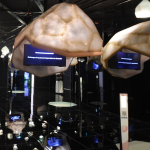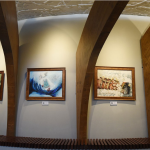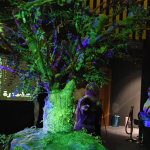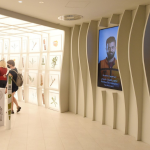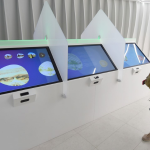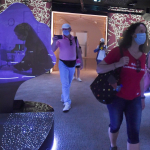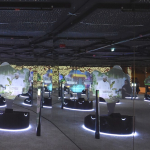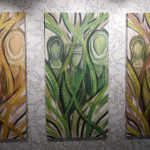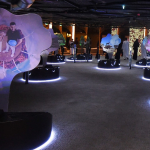Environment
10 Sustainable Nature Projects Showcased At The Oman Pavilion In Expo 2020 Dubai

The Sustainability Forest at Oman’s Pavilion in Expo 2020 Dubai hosts Omani projects of a sustainable nature. These projects highlight a key theme of this global event; namely, sustainability.
Among the projects showcased at the Oman Pavilion is the Million Date Palm Plantation Project. It has 11 farms that are spread across different regions of the Sultanate of Oman, such as Ibri, Nizwa, Al Safa, and Rahab.
Each of these farms is home to between 10 to 100 thousand palm trees. The project aims to achieve food security and economic growth within the Sultanate. With the funding of the Oman Technology Fund, Engineers Malek and Younis from Wakan Tech – a technology startup operating in the agriculture sector – are using drone technology to pollinate date palm trees 300 times faster than traditional pollination.
Meanwhile, Waleed and his team at Blue Waters Company and Fisheries Development Oman are developing a high-tech Fish Farming Station to develop the Aquaculture sector.
The sector benefits from vast-spanning Omani coasts that extend beyond 3,165kms and overlook the Arabian Sea and Sea of Oman.
The ultimate goal, yet again, is to fulfill food security and economic growth. This project is one of several many funded by the Oman Technology Fund to support young Omani talents and harvest their true potential.
The Sustainability Forest at Oman Pavilion also hosts a cooperation project between the Sultanate of Oman and the United Arab Emirates.
They join forces to harvest the power of the wind to produce electricity in a sustainable manner. Set in the region of Harweel in Oman, the Dhofar Wind Power Project is the first large-scale wind project in the Arabian Gulf region.
This project is a collaboration between Abu Dhabi Future Energy Company (MASDAR) and the Rural Areas Electricity Company of Oman (TANWEER).
Madinat Al Irfan, which is a sustainable urban development project by Oman Tourism Development Company (OMRAN) is also coming to life in the city of Muscat. The award-winning design created by Omani architects is adapted to create an urban habitat in Oman and set a unique standard for its residents, businessmen, and tourists.
The groundbreaking project is the product of an exciting ambition to establish a new urban center within Muscat. Situated in close proximity to the new Muscat International Airport and enjoying excellent transport connections to the city center and beyond, Madinat Al Irfan will become the gateway to Oman by creating a new downtown for residents, businesses, and visitors.
The city will furthermore establish an integrated sustainable and inclusive community, catering to different age and ethnic groups, and various income brackets.
Oman’s pavilion also hosts the Office for Conservation of the Environment from the Diwan of Royal Court. With a focus on the Arabian Leopard that is an endangered and rare breed of tigers present in scarcity across the Arabian peninsula, the government body is said to have taken measures to preserve the wild creature in its natural habitat in Dhofar, knowing its value and importance to the wildlife and the environment in the region.
It is understood that there are fewer than 200 Arabian Leopards in the region today and that the Sultanate, represented by the Diwan of the Royal Court, is making persistent efforts to preserve and protect the Arabian Leopard from extinction.
These relentless efforts have contributed to stability in the numbers of Arabian Leopards and the sustainable conservation of its natural habitats in Dhofar.
The Oman Pavilion at Expo 2020 Dubai also tells the tale of the first Botanic Garden in Oman and the largest in the Arabian Peninsula.
The garden exclusively hosts Oman’s native plants. Oman Botanic Garden is a world-class development of the Diwan of Royal Court in Oman and is currently operated by the Ministry of Heritage and Tourism.
It houses unique plants, landscapes, and cultural traditions of Oman. Located just outside of Muscat, near the Al Khoudh village, the garden sits on a 430-hectare protected natural area, surrounded by the Northern Mountains of Oman.
The Botanic Garden is currently under construction and upon opening will showcase all the native plant species in a series of carefully curated, naturalistic habitats from dry deserts to rich monsoon cloud forests.
Making its mark at the Expo 2020 Dubai is Be’ah – a government-owned company that specialises in waste management.
Having transformed the Al Amerat Landfill in Muscat to become an engineered landfill that has since become a common stop-point for migratory birds for feeding during their travels, Be’ah boasts of sustainable projects that focus on the environment.

The striking-looking Frankincense Crystals Section in the pavilion is next on our list of future projects that will drive digital transformation in Oman.
As the nation pursues its goals to achieve a knowledge-based economy, e-Mushrif Inc, which is a Muscat-based IoT and AI company, has taken the charge to exhibit its locally-developed technologies – ‘Rased’ and ‘Sahala’ – which helped enable the Sultanate to deal with managing and quarantining passengers returning to Oman during the peak of the COVID-19 pandemic.
The company has also developed software to allow parents to track their children’s ride on the school bus, ensuring their safe travels.
Next in line with their tech is the Sultan Qaboos Academic Chair for Quantitative Water Management. They form one of 16 academic chairs and scholarships spread across prestigious universities around the world, focusing on different majors, in the name of the late Sultan Qaboos.
The Utrecht University Chair in the Netherlands researches the similarities and differences in water problems, and solutions in the wet deltas of the Western world, as well as the extremely dry areas in the Middle East.
Meanwhile, Dr. Fatma Al Maamari, the winner of the 2019 L’Oreal-Unesco for Women in Science Fellowship, is using spintronics technology to develop an eco-friendly substitute for Rare Earth Elements that use unsustainable practices in mining.
Rare earth elements are used in technology devices, smartphones, television screens, laptops, and other gadgets.
-

 Banking & Finance1 month ago
Banking & Finance1 month agoOman Oil Marketing Company Concludes Its Annual Health, Safety, Environment, and Quality Week, Reaffirming People and Safety as a Top Priority
-
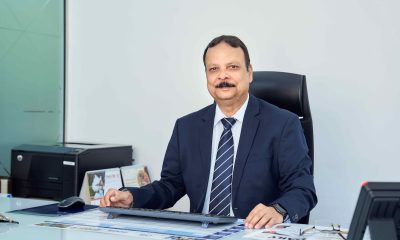
 News2 months ago
News2 months agoOIG Appoints New CEO to Lead Its Next Chapter of Excellence
-

 News2 months ago
News2 months agoReport: How India & The Middle East Are Exploiting Immense Economic Synergies
-

 Uncategorized2 months ago
Uncategorized2 months agoOman’s ISWK Cambridge Learners Achieve ‘Top in the World’ and National Honours in June 2025 Cambridge Series
-

 Economy2 months ago
Economy2 months agoPrime Minister of India Narendra Modi to Visit the Sultanate of Oman on 17-18 December
-

 News1 month ago
News1 month agoJamal Ahmed Al Harthy Honoured as ‘Pioneer in Youth Empowerment through Education and Sport’ at CSR Summit & Awards 2025
-

 Economy2 months ago
Economy2 months agoOman’s Net Wealth Reaches $300 Billion in 2024, Poised for Steady Growth
-

 News2 months ago
News2 months agoIHE Launches Eicher Pro League of Trucks & Buses in Oman

